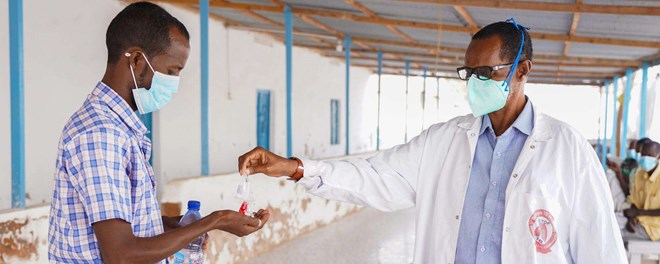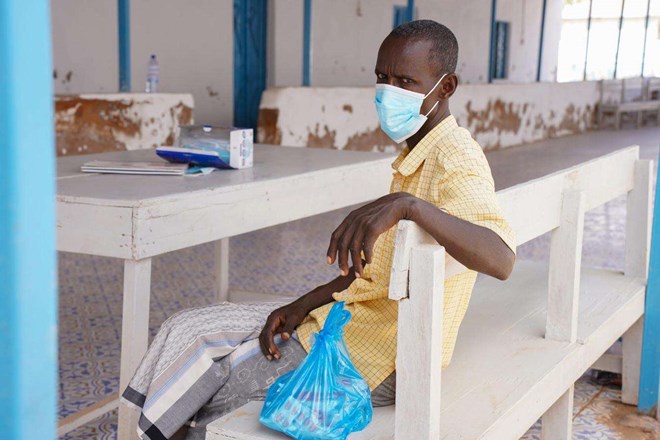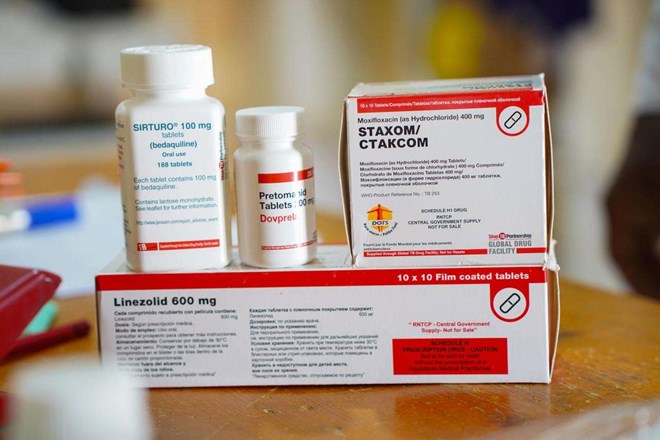
Monday September 30, 2024
A new treatment regimen called BPaLM is making it easier for Somali MDR-TB patients to complete their full course of medications.

Dr. Ahmed Hassan gives his patient Liban Noor his daily dose of treatment for drug-resistant tuberculosis at the MSF-supported TB Hospital in Galkayo North, Somalia. | Somalia 2024 © Mohamed Ali Adan/MSF
Somalia ranks among the 30 countries with the highest multidrug-resistant tuberculosis (MDR-TB) burden globally. Tuberculosis (TB) patients in Somalia often face numerous barriers to accessing timely diagnosis and appropriate treatment, which significantly contributes to worse health outcomes and the development of drug-resistant tuberculosis (DR-TB). A new, shorter treatment regimen for DR-TB is changing patients' lives and providing a new hopeful outlook for tuberculosis treatment in Somalia.
“The BPaLM treatment regimen, which gets its name from being composed of the drugs bedaquiline, pretomanid, linezolid, and moxifloxacin, has reduced both the duration of treatment and the number of tablets a patient has to take,” says Dr. Ahmed Hassan, a medical doctor who has worked for 18 years at the Mudug Tuberculosis Hospital in Galkayo, which is supported by Doctors Without Borders/Médecins Sans Frontières(MSF). “Now, treatment lasts only six months, and patients take just six or seven tablets daily. This has greatly improved treatment compliance and reduced many of the adverse effects patients used to experience, such as leg pain and body aches.”
You can’t imagine the pain of not being able to provide for [your] family, watching them struggle while you feel helpless. I was very worried because I thought I had a deadly disease that indeed made me fear for my life. But it turned out differently. I feel healthy after taking the medication. - Abdi Mohamed, MSF patient
The availability of this new treatment regimen is especially vital in countries afflicted by conflict, like Somalia, where limited access to health care makes effective treatment more difficult.
“During the first four months, I couldn’t get out of bed and felt like a lifeless body,” says Ahmed Elmi Mohamud, a 65-year-old former schoolteacher from Garowe, in northeastern Somalia. “But now, I feel much better.”
He shares his journey of overcoming tuberculosis after receiving treatment at Mudug Tuberculosis Hospital:
“I took every single dose of the medication as prescribed, without missing any, because I knew how important it was for me. I felt like each pill was a step closer to getting my life back. After six months of taking the prescribed tablets, I finally won the fight against tuberculosis.”
While Ahmed experienced some side effects, “more importantly,” he says, “ it helped me overcome a disease that once made me fear for my life.”

Abdi Mohamed Ali sits in a waiting room at the MSF-supported TB hospital in Galkayo North, where he receives treatment. Somalia 2024 © Mohamed Ali Adan/MSF
A shorter treatment regimen, a better option for Somalia
Recurrent conflicts and drought—among other climatic hazards—in the northeast region of Somalia have led to displacement, forcing many families to live in overcrowded conditions. People also contend with a weak health care system and food insecurity, leading to poor nutrition. These are all exacerbating factors that heighten the risk of catching an infectious disease like TB or DR-TB within households and communities.
“When I tested positive for tuberculosis, I could not go to work anymore,” says Abdi Mohamed, who is currently in treatment at the TB hospital. “Honestly, you can’t imagine the pain of not being able to provide for [your] family, watching them struggle while you feel helpless. I was very worried because I thought I had a deadly disease that indeed made me fear for my life. But it turned out differently. I feel healthy after taking the medication.”
Tuberculosis medications in Somalia.

Medications used to treat drug-resistant tuberculosis (DR-TB) at the MSF-supported Mudug Regional Hospital in Galkayo South, Somalia. Somalia 2024 © Mohamed Ali Adan/MSF
Financial barriers limit access to care
Most patients receiving treatment at the TB hospital come from villages and towns surrounding Galkayo. Unable to work because of their disease, many people struggle to afford transportation to and from Galkayo. Accommodation is also a challenge as some patients have no family members to host them in town, making it even more difficult to adhere to their prescribed medication. People with limited income and resources have to make difficult decisions to prioritize their health, and as a result, many are unable to access consistent treatment.
“The biggest challenge is that many of these patients do not live in this town,” says Dr. Hassan. “They come from distant areas, and the treatment lasts for many months. They do not have access to shelter and food. This center operates as an outpatient facility.”
“We serve those within the town daily or weekly,” he says. “For those who live outside the town, we provide them with a month's supply of medication.”
Liban Noor is a resident of Hilmo village, which is on the outskirts of Galkayo. After completing his six-month treatment, unfortunately, Liban tested positive again. He has now been under BPaLM treatment for 40 days, holding onto hope while continuing his relentless battle against the disease.
“My biggest challenge right now is that I am not from this town, and I don’t have a place of my own to stay,” says Liban. “It is like being a stranger with nowhere to call home.”
How MSF is responding in Galkayo
MSF teams manage the treatment of DR-TB at Mudug Tuberculosis Hospital in collaboration with the Ministry of Health and the national tuberculosis program. This year, of the 10 patients currently undergoing the BPaLM treatment regimen, two have successfully completed it, with promising outcomes that underscore the regimen's effectiveness.
The BPaLM regimen is showing impressive results, offering hope to patients in Somalia. With fewer side effects and a shorter treatment period, this approach has the potential to transform TB care in the country. In regions where health care access is limited due to ongoing conflict and drought, scaling up the use of this regimen could greatly improve patient outcomes.
By focusing on accessible and efficient care, MSF's efforts to roll out the BPaLM regimen demonstrate our commitment to tackling DR-TB, particularly in areas where consistent treatment remains a challenge.
To ensure wider access, there is an urgent need to decentralize TB care in Somalia. By bringing treatment closer to remote and underserved communities, it will be easier for patients to access the care they need, improve their adherence to treatment, and reduce the burden of long journeys to hospitals. Decentralizing TB care, alongside scaling up the BPaLM regimen, is crucial to reach more patients and make lasting progress in the fight against DR-TB.